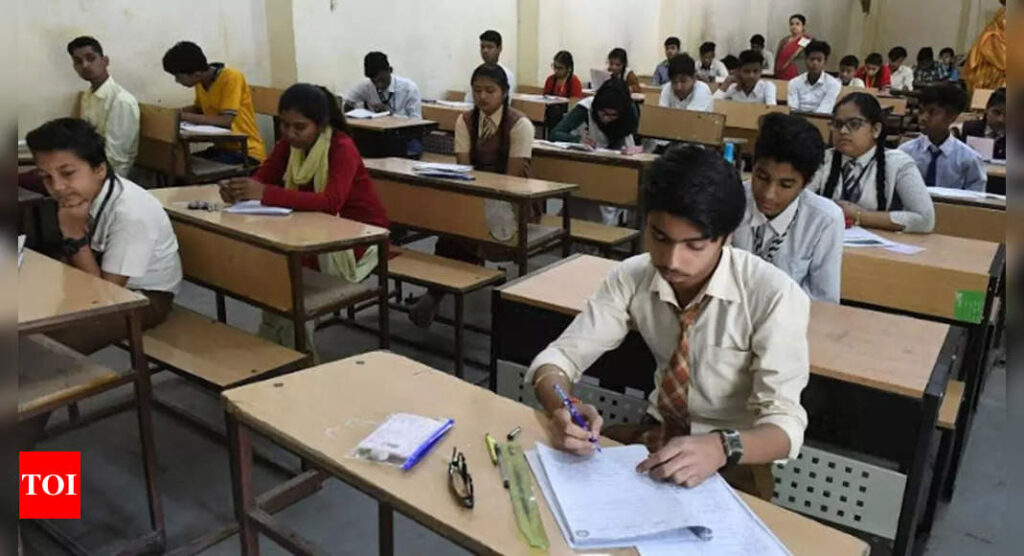NEW DELHI: A rethink on the proposed semester system and multiple Board exams and making inclusion of Indian languages mandatory in Classes XI-XII will top the agenda when the national steering committee meets in Bengaluru on June 14 to finalise the National Curriculum Framework (NCF).
While RSS-affiliated organisations raised concern over non-inclusion of Indian languages in Classes XI-XII as well as leaving scope for not learning them, school Boards expressed concern over the feasibility of the semester system (modular approach) and multiple Board exam proposals for Classes IX-XII. The final document is likely to be announced by the Centre later this month.
The national steering committee is expected to specifically mention “Indian languages” in the categories R2 and R3, instead of keeping it open-ended like in the draft NCF, which said students will learn at least three languages in their school years – “R1”, “R2”, and “R3”. “R1 is often the most commonly used local language, R2 could be any other language, including English. R3 will be any other language that is not ‘R1’ or ‘R2’,” it said.
Moreover, as per the draft NCF, the students of Classes IX to XII need to complete two essential courses from each of the eight curricular areas. The curriculum design for Classes XI-XII is such that a student “must complete 16 choice-based courses to complete Grade 12”. The eight curricular areas include humanities, social science, science, mathematics and computing, arts, vocational education, sports, and inter-disciplinary areas. However, languages have been clubbed with literature and philosophy in the curricular areas of humanities. A senior official, who is part of the NCF exercise, said: “Number of organisations affiliated to RSS have expressed discontent as the document is silent on Indian languages in the operative parts. Moreover, languages have been put in the curricular areas of humanities, which can be easily skipped when choosing essential courses. The national steering committee is likely to take a call on recommending to make learning Indian languages in Classes XI and XII mandatory.”
The committee, headed by former Isro chief K Kasturirangan, would also deliberate on the suggestions received from experts, states and school education boards regarding multiple board exams and semester system for higher classes. While the draft NCF proposed a semester structure, if possible, for Classes IX-X, for Classes XI and XII, it said: “This phase of the secondary stage would be divided into semesters and each choice-based course would be for a semester.” The draft also stated that “modular Board examinations will be offered as opposed to a single examination at the end of the year. The final certification will be based on the cumulative result of each of the examinations”.
“These are some of the key areas where teachers, schools, experts and even education boards suggested rethinking,” said the official. According to a senior CBSE official, “External annual exam is still a requirement. CBSE’s semester experiment has not been a success and the internal assessment atmosphere is not yet conducive in India.”
While RSS-affiliated organisations raised concern over non-inclusion of Indian languages in Classes XI-XII as well as leaving scope for not learning them, school Boards expressed concern over the feasibility of the semester system (modular approach) and multiple Board exam proposals for Classes IX-XII. The final document is likely to be announced by the Centre later this month.
The national steering committee is expected to specifically mention “Indian languages” in the categories R2 and R3, instead of keeping it open-ended like in the draft NCF, which said students will learn at least three languages in their school years – “R1”, “R2”, and “R3”. “R1 is often the most commonly used local language, R2 could be any other language, including English. R3 will be any other language that is not ‘R1’ or ‘R2’,” it said.
Moreover, as per the draft NCF, the students of Classes IX to XII need to complete two essential courses from each of the eight curricular areas. The curriculum design for Classes XI-XII is such that a student “must complete 16 choice-based courses to complete Grade 12”. The eight curricular areas include humanities, social science, science, mathematics and computing, arts, vocational education, sports, and inter-disciplinary areas. However, languages have been clubbed with literature and philosophy in the curricular areas of humanities. A senior official, who is part of the NCF exercise, said: “Number of organisations affiliated to RSS have expressed discontent as the document is silent on Indian languages in the operative parts. Moreover, languages have been put in the curricular areas of humanities, which can be easily skipped when choosing essential courses. The national steering committee is likely to take a call on recommending to make learning Indian languages in Classes XI and XII mandatory.”
The committee, headed by former Isro chief K Kasturirangan, would also deliberate on the suggestions received from experts, states and school education boards regarding multiple board exams and semester system for higher classes. While the draft NCF proposed a semester structure, if possible, for Classes IX-X, for Classes XI and XII, it said: “This phase of the secondary stage would be divided into semesters and each choice-based course would be for a semester.” The draft also stated that “modular Board examinations will be offered as opposed to a single examination at the end of the year. The final certification will be based on the cumulative result of each of the examinations”.
“These are some of the key areas where teachers, schools, experts and even education boards suggested rethinking,” said the official. According to a senior CBSE official, “External annual exam is still a requirement. CBSE’s semester experiment has not been a success and the internal assessment atmosphere is not yet conducive in India.”

